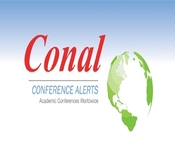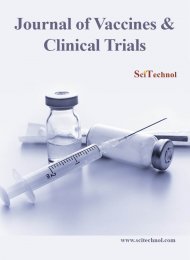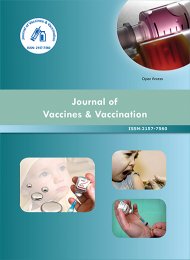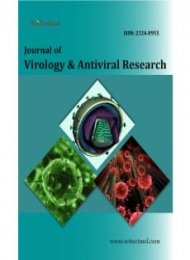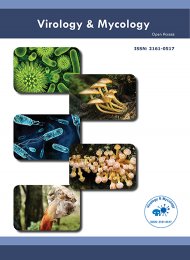Theme: Awareness and Knowledge on Virology and Infectious Diseases for Healthy Life
Virology Meet 2022
Conferenceseries LLC Ltd cordially invites you to attend the “9th World Summit on Virology, Microbiology & Infectious Disease” which is forthcoming in the month of September 26-27, 2022 | Webinar.
Theme: "Awareness and Knowledge on Virology and Infectious Diseases for Healthy Life"
Virology Meet 2022 conference invites all the renowned scientists, Microbiologists, Virologists, Epidemiologists, Vaccinologists, Immunologists, Health-Care Professionals. The 9th World Summit on Virology, Microbiology & Infectious Disease will be a unique chance for High-quality scientific program with the series of talks, poster presentations, workshops, discussions, and networking events will keep participants engaged in learning and making new connections at Virology Meet 2022.
Conference Series LLC Ltd is delighted to invite you to attend the “9th World Summit on Virology, Microbiology & Infectious Disease”, one of its remarkable Virology conferences, to be held during September 26-27, 2022 | Webinar with the theme "Awareness and Knowledge on Virology and Infectious Diseases for Healthy Life" emphasizing on recent areas of more optimized research techniques like General Virology, Vaccination, Emerging Infectious Diseases, Viral Immunology, Molecular virology, Food Virology. This Virology Meet 2022 Conference includes a wide range of Keynote presentations, Oral talks, and Poster presentations.
Brochure: click here
Virology Meet 2022 is an international conference to present a paper to the experts, influencers, young researchers. It gives you the platform to exchange your interest and related thoughts, paving the way for possible future collaborations. Use this platform to build connections with an elite group of eminent personalities to enhance your intellect. Young entrepreneurs, this is a great platform to connect with your peers.
Abstract submission: click here
The Conference will provide convocation for you to energize your knowledge and analyse the innovations in Virology. This involves some topics like presentations, Oral talks, Poster Presentations, E-Poster. This Diabetes conference deals with advancement of technology, innovation and research in related to General Virology, Molecular and Cellular Virology, Animal Virology, Clinical and Diagnostic Virology, Viral Immunology, Anti-Retroviral Therapy.
Registration: click here
The Virology Meet 2022 anticipates participants, renowned speakers and eminent delegates across the globe to be attending the conference to share their valuable presentation and galvanize the scientific community. Scientific people from all over the globe focused on learning about emerging technologies about Virology, Microbiology emerging diseases. This is a best globalized opportunity to reach the largest assemblage of participants from the scientific community and research.
Conduct presentations, meet with current, potential scientists, distribute information and make a splash with new drug research developments, and receive name recognition at this event. Renowned speakers and therefore the most up-to-date techniques, developments, the most recent updates in Virology are hallmarks of this conference.
Who should attend and Whom You’ll Meet?
Directors/Senior Directors/Executive Directors and Vice Presidents/Senior Vice Presidents/Executive Vice Presidents and Heads/Leaders/Partners of
- CROs and CMOs
- Pharma Research Sites
- Pharma/Biotech and Medical Device industries
- Hospitals, Associations
Benefits of Attending Conference:
Communicate ideas and network with leading microbiologists, virologists professionals and also researchers from more than 40 countries.
Participants can attain direct access to a core audience of professionals and decision makers and can increase clarity through branding and networking at the conference.
Prepare and discuss key news and challenges with senior level speakers.
With presentations, panel discussions, roundtable discussions, and workshops, we cover each and every topic from global macro issues to approach to diplomatic issues.
Highlights of the Conference:
Meet the Health care experts, microbiologists, virologists from different countries all over the world.
Meet your associates and evaluate your research in front of experts
World-class platform to show your products and services.
Exclusive of 25 presentations from Industry and Academia leader
One- to-one intercommunication, B2B, and B2A etc.
Well standardized Scientific Program with hours of Networking sessions
Bilateral panel discussions and Q&A sessions
Outstanding Poster Awards, Young Research Forums
Target Audience
- Microbiologists
- Virologists
- Epidemiologists
- Research scholars Vaccinologists
- Immunologists
- Health-Care Professionals
- Researchers and Scientists
- Training Institutes
- Universities and Colleges Students
- Associations and Societies
- Pharmaceutical and Healthcare Companies
- Business Entrepreneurs
- Medical colleges
- Viral Diseases Researchers
The conference tracks are set to cover various perceptions of researches involved with Viral Diseases and their control measures. This would help to accommodate every possible researchers working on Viruses to help build a vivid picture about this. We will have speakers, poster sessions and workshops designed to represent the talks from experts and students.
Why to attend?
The Virology Meet 2022 anticipates participants, renowned speakers and eminent delegates across the globe to be attending the conference to share their valuable presentation and galvanize the scientific community. Scientific people from all over the globe focused on learning about emerging technologies about Virology, Microbiology emerging diseases. This is a best globalized opportunity to reach the largest assemblage of participants from the scientific community and research.
Conduct presentations, meet with current, potential scientists, distribute information and make a splash with new drug research developments, and receive name recognition at this event. Renowned speakers and therefore the most up-to-date techniques, developments, the most recent updates in Virology are hallmarks of this conference.
Track 1: General Virology
A virus is an binding intracellular parasite, which means that it can live only within the host cell and also depends on it for reproduction and metabolic processes, for example protein synthesis. Generally Viruses can be categorized depending on their genome (DNA or RNA) or several structural components, like capsid, the envelope, and viral receptor proteins. The viral replication cycle occurs within the host cell and engages attachment to and penetration of the host cell, uncoating and replication of the nucleic acid, synthesis of virus proteins, congregation of the components, and also provides a new viruses via budding or cell lysis. This procedure of nucleic acid replication are differs among DNA and RNA viruses. The host body has different physical and immunological defense mechanisms to inactivate and eliminate viruses.
Europe: German Society for Virology, International Society for Antiviral Research, International Union of Microbiological Societies, Society for General Microbiology, European Society for Veterinary Virology, Dutch Society for Medical Microbiology, European Society of Clinical Microbiology and Infectious Diseases, Federation of European Microbiological Societies (FEMS).
Asia-Pacific: International Society for Applied Phycology; International Union of Microbiological Societies; Microscopy Society (Singapore), Singapore National Academy of Sciences; Japanese Society of Microbial Ecology, Asia Pacific Society for Marine Biotechnology; Committee of Asia Pacific Electron Microscopy Societies; Federation of Asia Pacific Microbiological Societies.
U.S.A: IUMS International Union of microbiological societies, Southern California Branch of the American Society for Microbiology (SCASM), American society for microbiology, SIMB-Society for industrial Microbiology and biotechnology, SFAM-Society for Applied Microbiology-London, Society for industrial microbiology.
Track 2: Corona Virus
Coronavirus is a different kind of virus that has many types, and few of them cause disease. A coronavirus identified in 2019, SARS-CoV-2, has produced a pandemic of respiratory illness, which is called as COVID-19. Medication for COVID-19 refers the signs and symptoms of the infection and carries people with more severe disease. People with health issues like diabetes, chronic breathing problems, heart related diseases, and cancer and also in elder are more likely to increase serious illness. Currently, no specific medication is there for disease caused by a novel coronavirus.
Europe: German Society for Virology, International Society for Antiviral Research, International Union of Microbiological Societies, Society for General Microbiology, European Society for Veterinary Virology, Dutch Society for Medical Microbiology, European Society of Clinical Microbiology and Infectious Diseases, Federation of European Microbiological Societies (FEMS).
Asia-Pacific: International Society for Applied Phycology; International Union of Microbiological Societies; Microscopy Society (Singapore), Singapore National Academy of Sciences; Japanese Society of Microbial Ecology, Asia Pacific Society for Marine Biotechnology; Committee of Asia Pacific Electron Microscopy Societies; Federation of Asia Pacific Microbiological Societies.
U.S.A: IUMS International Union of microbiological societies, Southern California Branch of the American Society for Microbiology (SCASM), American society for microbiology, SIMB-Society for industrial Microbiology and biotechnology, SFAM-Society for Applied Microbiology-London, Society for industrial microbiology.
Track 3: Vaccination
Vaccination is an easy, safe, and an effective way of guarding you against dangerous diseases, before you contact them. It uses your body’s immunity to build resistance to particular infections and builds your immune system stronger. Vaccines make your immune system to produce antibodies, just as it does when it’s disclosed to a disease. However, as vaccines contain only dead or weakened forms of germs like viruses or bacteria, they do not lead to the disease or put you at risk of its complications.
Europe: German Society for Virology, International Society for Antiviral Research, International Union of Microbiological Societies, Society for General Microbiology, European Society for Veterinary Virology, Dutch Society for Medical Microbiology, European Society of Clinical Microbiology and Infectious Diseases, Federation of European Microbiological Societies (FEMS).
Asia-Pacific: International Society for Applied Phycology; International Union of Microbiological Societies; Microscopy Society (Singapore), Singapore National Academy of Sciences; Japanese Society of Microbial Ecology, Asia Pacific Society for Marine Biotechnology; Committee of Asia Pacific Electron Microscopy Societies; Federation of Asia Pacific Microbiological Societies.
U.S.A: IUMS International Union of microbiological societies, Southern California Branch of the American Society for Microbiology (SCASM), American society for microbiology, SIMB-Society for industrial Microbiology and biotechnology, SFAM-Society for Applied Microbiology-London, Society for industrial microbiology.
Track 4: Microbiology
Microbiology is a part of biological science that studies microorganisms, which are minute unicellular or cell-cluster organisms and infectious agents. The various types of microbes designed by microbiologists include bacteria, viruses, eukaryotes, fungi, archaea, protozoa, prions and algae. These microbes can variate dramatically in terms of size and features. Though microbes often carry negative connotations due to the association of certain microbes with diseases, many other microbes carry several benefits. For example, microbes underpin processes such as industrial fermentation (which is used to make useful products such as alcohol, vinegar and dairy products) and antibiotic production. They also act as molecular vehicles to transfer DNA to complex organisms such as plants and animals.
Europe: German Society for Virology, International Society for Antiviral Research, International Union of Microbiological Societies, Society for General Microbiology, European Society for Veterinary Virology, Dutch Society for Medical Microbiology, European Society of Clinical Microbiology and Infectious Diseases, Federation of European Microbiological Societies (FEMS).
Asia-Pacific: International Society for Applied Phycology; International Union of Microbiological Societies; Microscopy Society (Singapore), Singapore National Academy of Sciences; Japanese Society of Microbial Ecology, Asia Pacific Society for Marine Biotechnology; Committee of Asia Pacific Electron Microscopy Societies; Federation of Asia Pacific Microbiological Societies.
U.S.A: IUMS International Union of microbiological societies, Southern California Branch of the American Society for Microbiology (SCASM), American society for microbiology, SIMB-Society for industrial Microbiology and biotechnology, SFAM-Society for Applied Microbiology-London, Society for industrial microbiology.
Track 5: Microbial Infection
An infection causes when a microorganism enters a person's body and affects the body. The microorganism uses that person's body to survive itself, reproduce, and colonize. These contagious microscopic creatures are known as pathogens, and double quickly. Examples of pathogens comprise: bacteria. The transmission of bacteria is what occurs bacterial infections. You can become exhibited to pathogens from other people, the environment, or by eating or drinking contaminated food or water.
Europe: German Society for Virology, International Society for Antiviral Research, International Union of Microbiological Societies, Society for General Microbiology, European Society for Veterinary Virology, Dutch Society for Medical Microbiology, European Society of Clinical Microbiology and Infectious Diseases, Federation of European Microbiological Societies (FEMS).
Asia-Pacific: International Society for Applied Phycology; International Union of Microbiological Societies; Microscopy Society (Singapore), Singapore National Academy of Sciences; Japanese Society of Microbial Ecology, Asia Pacific Society for Marine Biotechnology; Committee of Asia Pacific Electron Microscopy Societies; Federation of Asia Pacific Microbiological Societies.
U.S.A: IUMS International Union of microbiological societies, Southern California Branch of the American Society for Microbiology (SCASM), American society for microbiology, SIMB-Society for industrial Microbiology and biotechnology, SFAM-Society for Applied Microbiology-London, Society for industrial microbiology.
Track 6: Emerging Virus
Emerging and re-emerging viral diseases have expanded in number and earthly extent during the last decades. Samples include the present COVID-19 pandemic, the recent pandemic of chikungunya, ebola and Zika viruses and the exposure of dengue and other arthropod-borne viruses in non-endemic areas. The main research rules include:
- Evaluation of molecular and serological diagnostic methods for involving viral infections
- Phylogenetic characterization of dengue and different arboviruses
- Observation of arboviral diseases in endemic and non-endemic areas
- Clinical presentation, prophylaxis and cure of COVID-19
Europe: German Society for Virology, International Society for Antiviral Research, International Union of Microbiological Societies, Society for General Microbiology, European Society for Veterinary Virology, Dutch Society for Medical Microbiology, European Society of Clinical Microbiology and Infectious Diseases, Federation of European Microbiological Societies (FEMS).
Asia-Pacific: International Society for Applied Phycology; International Union of Microbiological Societies; Microscopy Society (Singapore), Singapore National Academy of Sciences; Japanese Society of Microbial Ecology, Asia Pacific Society for Marine Biotechnology; Committee of Asia Pacific Electron Microscopy Societies; Federation of Asia Pacific Microbiological Societies.
U.S.A: IUMS International Union of microbiological societies, Southern California Branch of the American Society for Microbiology (SCASM), American society for microbiology, SIMB-Society for industrial Microbiology and biotechnology, SFAM-Society for Applied Microbiology-London, Society for industrial microbiology.
Track 7: Clinical virology
Clinical virology in the field of virology bothered about the disquisition of infections and infection like specialists, including their arrangement, sickness delivering parcels, and heritable rates that beget mortal pathologies. It's constantly considered as an interdisciplinary field of microbiology or pathology. The fitness to fete nucleic acids majorly affects diagnostics in clinical virology. Both polymerase chain response and nucleic sharp race grounded improvement can as of now be employed along with nonstop exposure to produce brings about a brief timeframe and to decide if variations applicable for antiviral inhibition are available.
Europe: German Society for Virology, International Society for Antiviral Research, International Union of Microbiological Societies, Society for General Microbiology, European Society for Veterinary Virology, Dutch Society for Medical Microbiology, European Society of Clinical Microbiology and Infectious Diseases, Federation of European Microbiological Societies (FEMS).
Asia-Pacific: International Society for Applied Phycology; International Union of Microbiological Societies; Microscopy Society (Singapore), Singapore National Academy of Sciences; Japanese Society of Microbial Ecology, Asia Pacific Society for Marine Biotechnology; Committee of Asia Pacific Electron Microscopy Societies; Federation of Asia Pacific Microbiological Societies.
U.S.A: IUMS International Union of microbiological societies, Southern California Branch of the American Society for Microbiology (SCASM), American society for microbiology, SIMB-Society for industrial Microbiology and biotechnology, SFAM-Society for Applied Microbiology-London, Society for industrial microbiology.
Track 8: Immunology
Immunology is the learning of the immune system and it is very crucial part of the medical and biological sciences. The immune system saves us from infection through different lines of defence. If the immune system is not working as it should, it can lead in disease, such as autoimmunity, allergy and cancer. It is also currently becoming clear that immune responses give to the development of many general disorders not traditionally viewed as immunologic, along metabolic, cardiovascular, and neurodegenerative conditions such as Alzheimer’s.
Europe: German Society for Virology, International Society for Antiviral Research, International Union of Microbiological Societies, Society for General Microbiology, European Society for Veterinary Virology, Dutch Society for Medical Microbiology, European Society of Clinical Microbiology and Infectious Diseases, Federation of European Microbiological Societies (FEMS).
Asia-Pacific: International Society for Applied Phycology; International Union of Microbiological Societies; Microscopy Society (Singapore), Singapore National Academy of Sciences; Japanese Society of Microbial Ecology, Asia Pacific Society for Marine Biotechnology; Committee of Asia Pacific Electron Microscopy Societies; Federation of Asia Pacific Microbiological Societies.
U.S.A: IUMS International Union of microbiological societies, Southern California Branch of the American Society for Microbiology (SCASM), American society for microbiology, SIMB-Society for industrial Microbiology and biotechnology, SFAM-Society for Applied Microbiology-London, Society for industrial microbiology.
Track 9: Immune Disorder
Immune system disorders give rise to abnormally low activity or over activity of the system. Medication for autoimmune diseases generally basis on reducing system activity. The blood cells within the body's system help saves against harmful substances. These substances carry antigens. The system gives rise to antibodies against these antigens that enable it to break up these harmful substances. If a person has auto-immune disease, then your system doesn't distinguish in between healthy tissue and potentially dangerous antigens. Due to this, the body activate a reaction that destroys normal tissues. The exact clarification for autoimmune disorders is unknown. One theory is that some microorganisms or drugs may changes the system.
Europe: German Society for Virology, International Society for Antiviral Research, International Union of Microbiological Societies, Society for General Microbiology, European Society for Veterinary Virology, Dutch Society for Medical Microbiology, European Society of Clinical Microbiology and Infectious Diseases, Federation of European Microbiological Societies (FEMS).
Asia-Pacific: International Society for Applied Phycology; International Union of Microbiological Societies; Microscopy Society (Singapore), Singapore National Academy of Sciences; Japanese Society of Microbial Ecology, Asia Pacific Society for Marine Biotechnology; Committee of Asia Pacific Electron Microscopy Societies; Federation of Asia Pacific Microbiological Societies.
U.S.A: IUMS International Union of microbiological societies, Southern California Branch of the American Society for Microbiology (SCASM), American society for microbiology, SIMB-Society for industrial Microbiology and biotechnology, SFAM-Society for Applied Microbiology-London, Society for industrial microbiology.
Track 10: Technological Innovations in Immunology
Arising technologies are broadening our understanding of the mortal vulnerable system, but staking on their operation will probably bear philosophical and practical changes to the way exploration is done.
- Vaccines
- Antihistamines
- Allergen products
- Immunotherapy products
- SLIT drops and tablets
- Pollinex Quattro
- Market sales by country & products
Europe: German Society for Virology, International Society for Antiviral Research, International Union of Microbiological Societies, Society for General Microbiology, European Society for Veterinary Virology, Dutch Society for Medical Microbiology, European Society of Clinical Microbiology and Infectious Diseases, Federation of European Microbiological Societies (FEMS).
Asia-Pacific: International Society for Applied Phycology; International Union of Microbiological Societies; Microscopy Society (Singapore), Singapore National Academy of Sciences; Japanese Society of Microbial Ecology, Asia Pacific Society for Marine Biotechnology; Committee of Asia Pacific Electron Microscopy Societies; Federation of Asia Pacific Microbiological Societies.
U.S.A: IUMS International Union of microbiological societies, Southern California Branch of the American Society for Microbiology (SCASM), American society for microbiology, SIMB-Society for industrial Microbiology and biotechnology, SFAM-Society for Applied Microbiology-London, Society for industrial microbiology.
The inventions made within the field of virology in the past century have been simply astonishing. It is no wonder to say that virologists have played a vital role in the biological revolutions of the last century. Some of the astonishing discoveries are Antiviral agents for treatment of Ebola virus disease, Kidney transplantation from HIV-positive donor to HIV-positive recipient, Gene editing of the HIV receptor, Indeterminate HIV nucleic acid test results in infants, Modified vaccine Ankara vaccine for prevention of smallpox, Outcomes for Zika virus-exposed infants in the second year of life.
Viral infectious diseases represent an important portion of global public health concerns with thousands of mortality worldwide. In spite of the success of currently available vaccines, there is a clear requirement for the development of vaccines against a number of infectious diseases for which vaccines are not yet available, or are insufficient, including HIV, hepatitis C virus, RSV, Neisseria meningitides serotype B, Group A and B, streptococcus, tuberculosis, and malaria. Unfortunately, these pathogens have proven difficult to control with traditional vaccines, and novel approaches will be required. New efficient vaccines may also be required to protect against a number of emerging or re-emerging infectious diseases, including severe acute respiratory syndrome, corona, Ebola, Hanta and Dengue viruses.
Coronavirus started in china and Spreads to nearly 40 countries. The Coronavirus had infected 78598 people only in China and the Mortality rate of the people affected by the Coronavirus is almost 2746. Here is the statistics of Coronavirus in other Countries. After China, Thailand has recorded the highest Coronavirus cases.
We are thankful to all our wonderful Speakers, Conference Attendees, Students and Associations for making Virology Meet 2022 Conference the best ever!
With the immense support of Organizing Committee we successfully hosted the 8th World Summit on Virology, Microbiology & Infectious Disease was held during July 11-12, 2022 | Webinar. Conference theme “Emerging Viral Diseases and Their Treatment Techniques”.
On behalf of Organizing Committee we express our appreciation towards those who helped this conference to be successful one. We are very grateful to all the Attendees, delegates, keynote speakers, plenary speakers, business partners, poster presenter, moderators, chair and co-chair from around the globe.
The conference gave the attendees a pleasant ride through the recent advancement and new technologies delivered for the Virology, Microbiology & Infectious Disease. This conference was thankful to its moderators: Andrew Jeremijenko, Hamad Medical Corporation from Qatar and Yaneysis Lamothe Reyes, University of Concepcion from Chile for their immense support to this conference.
The conference provided beautiful insights in the field of Virology, Microbiology & Infectious Disease by marking some remarkable speeches by the speakers:
Rashmi Sharma, Beneficial viruses: A review with special reference to Rajasthan
Rashmi Sharma, Antiviral effects of Elwendia persica with special reference to Rajasthan, India
Mohammad Akmal, Transgenic cotton (Gossypium hirsutum L.) showed resistance against cotton leaf curl virus
The conference and the attendees were very pleased to have these personalities among themselves as they delivered wonderful speeches in their respective area of researches.
Conference gives proper gratitude to Organizing Committee Members nimble of field various external professionals business enterprise councils and is obliged to different renowned personalities who interlocked with us and bolstered the symposium in each facet without which the convention might now not were possible. And bolstered the symposium in each facet without which the convention might now not were possible. Your reaction is our inspiration; preserving this motto in thoughts and being discovered the triumph of Virology Meet 2022
The supporting journals include:
- Journal of Vaccines & Clinical Trials
- Journal of Vaccines & Vaccination
- Journal of Virology & Antiviral Research
- Virology & Mycology
We welcome all of the famous investigators pupils and delegate partakers to participate on this upcoming convention to witness precious medical discussions and assist to the destiny improvements within the discipline of Virology, Microbiology & Infectious Disease.
To share your views and research, please click here to register for the Conference.
To Collaborate Scientific Professionals around the World
| Conference Date | October 10-11, 2022 | ||
| Sponsors & Exhibitors |
|
||
| Speaker Opportunity Closed | |||
| Poster Opportunity Closed | Click Here to View | ||
Useful Links
Special Issues
All accepted abstracts will be published in respective Our International Journals.
- Journal of Vaccines & Clinical Trials
- Journal of Vaccines & Vaccination
- Journal of Virology & Antiviral Research
Abstracts will be provided with Digital Object Identifier by







